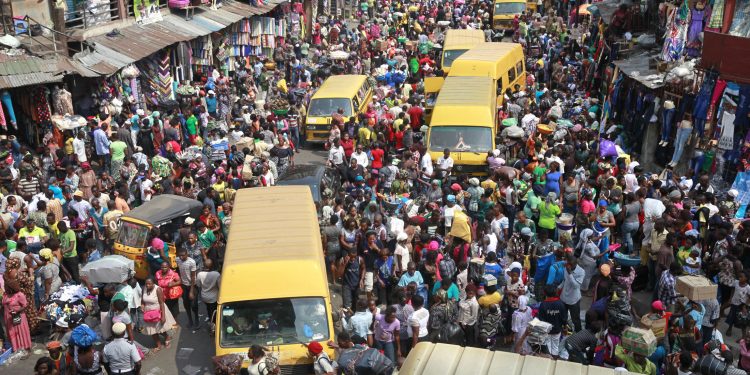The developing world’s hidden inflation risks
As the global economy begins to emerge from the COVID-19 crisis, managing inflation risks will be much more challenging in developing countries than in advanced economies. That reflects the nature of the shocks driving inflation and the fact that lower-income countries are ill-equipped to respond to them decisively.
A combination of specific shocks and vulnerabilities could thus seriously threaten these countries’ economic stability and prosperity.
For starters, developing countries have much greater exposure to environmental shocks, which will become more frequent and severe as a result of climate change. Extreme weather events in effect act as negative supply shocks, causing production to decline and prices to rise – the most difficult conditions for monetary policymakers.
Several countries, including Nigeria and Sri Lanka, are currently facing skyrocketing food prices, while Madagascar’s drought and ensuing famine is another stark reminder of African developing countries’ vulnerability.
Developing economies are also more exposed to financial shocks. Sooner or later, monetary policy in advanced economies will normalize and, if past experience is any guide, many emerging markets and poor countries will experience massive capital outflows.
The specter of capital flight may be particularly salient for poorer economies, particularly if accompanied by a reduction in development aid. Such sudden stops bring their own policy dilemmas, not least downward pressure on exchange rates. Policymakers can either let their currencies depreciate, which would fuel inflation, or hike interest rates, which would adversely affect growth and debt sustainability.
Both types of inflationary shock will be a severe test for monetary policymakers in poorer countries. Many lack the experience and track record needed to ensure their credibility and stabilize inflation expectations. Several negative feedback loops could thus develop.
For countries with high levels of foreign-currency-denominated debt, exchange-rate depreciation could lead to a fatal currency mismatch, triggering a debt crisis and a surge in inflation. And the de-anchoring of inflation expectations could have further ramifications for developing economies’ already frail financial systems.
Moreover, inflation tends to persist long after exchange-rate devaluations. Expenditure-switching policies aimed at replacing increasingly costly imports with cheaper domestically produced goods have often resulted only in mediocre growth and stubbornly high inflation. This has eroded households’ purchasing power, fueling poverty and social instability.
Part of the policy response to these inflation risks is in the hands of developing countries themselves. A credible fiscal policy framework would go a long way toward stabilizing expectations and eliminating the risk of fiscal dominance. While fiscal consolidation in the midst of a pandemic is clearly not appropriate, stricter control of corruption and a reduction of leakages would help to ensure that public spending reaches its intended beneficiaries and maximize its impact.
Corruption costs developing economies an estimated $1.3 trillion per year, or three-quarters of Sub-Saharan Africa’s GDP. The COVID-19 crisis should spur developing-country governments to crack down on misuse of public funds. This will create fiscal space to soften the impact of inflation on the poorest households while setting the stage for recovery and sustained economic growth.
But the international community also can help lower-income countries navigate inflationary pitfalls. In such cases, macroeconomic stability in the poorest countries depends heavily on external finance. The international community thus urgently needs to prop up developing economies’ international reserves in order to support their currencies and tame inflation risks.
Read Also: Forex Week Ahead: Cedi outlook stable as Ghana seeks to lure foreign investment
While inflationary pressures generally remain under control for now, the risk of inflation in these economies may materialize in non-linear ways. For example, the continued depletion of international reserves could cause a country’s currency to depreciate suddenly. This may precipitate spiraling inflation, especially if the authorities lack the credibility to anchor expectations.
Accelerating inflation, along with worsening growth and employment prospects, will expose developing economies to the kind of sociopolitical instability recently seen in Tunisia, South Africa, Nigeria, and Senegal. The spillover effects from such turmoil are just what the world economy does not need as it recovers from the pandemic.
Fortunately, the International Monetary Fund’s recent new $650 billion allocation of special drawing rights represents an ideal opportunity to assist developing economies. Although SDRs have increasingly (and rightly) been viewed as a development tool, they are essentially a reserve asset that can have important anti-inflationary benefits.
Ensuring that more of the new SDRs go from advanced economies to developing countries will bolster poorer countries’ international reserves and thus help to shield billions of people against the risk of inflation. That, in turn, will provide room for national authorities and the private sector to act decisively to reignite growth and reduce poverty.
Much of the developing world is still in the throes of the pandemic. But even before the coronavirus is defeated, monetary policymakers may have to address potentially serious inflation threats. They should start preparing now.
Rabah Arezki, a former chief economist of the World Bank’s Middle East and North Africa Region, is Chief Economist and Vice President of Economic Governance and Knowledge Management at the African Development Bank. Jean-Pierre Landau is Associate Professor of Economics at Sciences Po.








